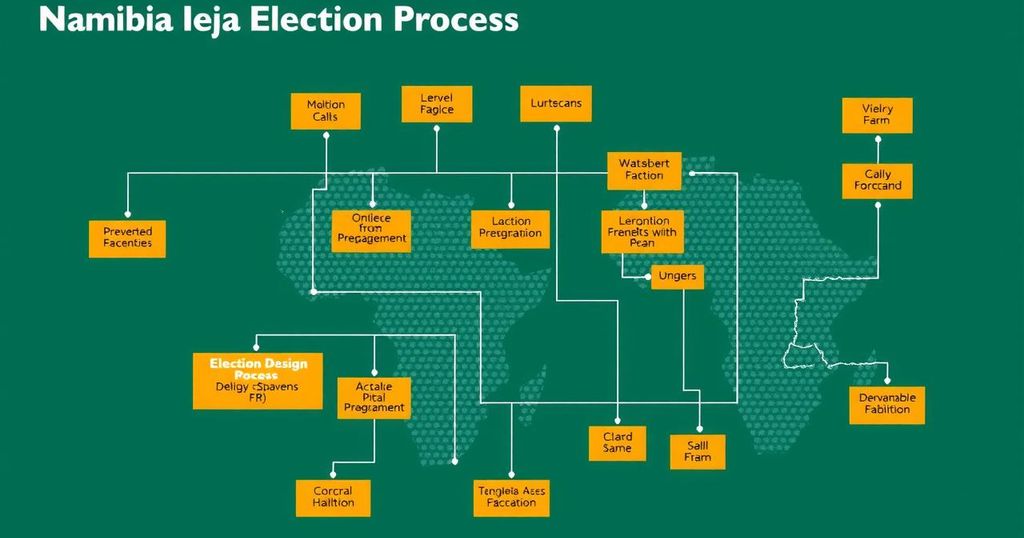World news
AFRICA, AFRICAN NATIONAL CONGRESS, BOTSWANA DEMOCRATIC PARTY, DEMOCRACY, FRELIMO, GOVERNANCE, GOVERNMENT, JOHANNESBURG, JOHN ELIGON, LIBERATION PARTY, MOZAMBIQUE, NAMIBIA, OPPOSITION, OSCAR VAN HEERDEN, PARLIAMENTARY SEATS, POLITICS, SOUTH AFRICA, SOUTH WEST AFRICA PEOPLE ’ S ORGANIZATION, TIM, TIMO SHIHEPO, WINDHOEK
Elena Martinez
0 Comments
Namibia’s Upcoming Elections: A Crucial Test for SWAPO and the Youth Vote
Namibia is set to hold elections where SWAPO faces significant challenges due to economic hardships, high unemployment, and public dissatisfaction. Recent setbacks for liberation parties in Southern Africa raise questions about SWAPO’s ability to maintain power. The youthful electorate, over 40 percent of voters, seeks new political narratives, while the election could either confirm SWAPO’s dominance or introduce significant political change.
Voters in Namibia are set to participate in crucial elections on Wednesday, marking an important moment for the South West Africa People’s Organization (SWAPO). This party has faced increasing discontent due to escalating issues such as high unemployment, government corruption, and inadequate housing since it assumed power following independence in 1990. The context of this election is characterized by a series of electoral defeats across Southern Africa for liberation parties that once led the fight against colonial oppression.
Recent electoral downturns include the African National Congress in South Africa, which lost its longstanding majority, and the Botswana Democratic Party, which suffered a significant defeat in its latest election. Furthermore, Frelimo in Mozambique won elections amid accusations of vote manipulation, leading to social unrest. These setbacks raise questions about SWAPO’s ability to retain its electoral dominance as younger voters, comprising over 40 percent of Namibia’s registered electorate, increasingly seek political change, disillusioned by past liberation narratives.
The youth demographic in Namibia is leveraging their potential to reshape the political landscape, as many express frustration over the prevailing socioeconomic conditions. While popular South African artists are being employed by SWAPO to attract younger voters, experts caution that high registration rates do not guarantee turnout at the polls.
The economic landscape presents stark challenges; with over 30 percent unemployment and a significant housing shortage, many citizens are losing faith in the government’s ability to address critical issues. Discontent regarding land ownership also persists, predominantly withheld by elites.
Despite the obstacles, SWAPO could potentially benefit from the fragmentation of opposition votes due to the presence of 14 candidates vying for the presidency, which might facilitate their continued dominance. The prominent candidates include SWAPO’s Netumbo Nandi-Ndaitwah, aiming to be Namibia’s first female president since independence, and former SWAPO member Panduleni Itula, who now leads the Independent Patriots for Change. A runoff election could occur if no candidate secures a majority in the first round, which would be a significant first in Namibian political history.
Overall, the impending election bears significant implications, as it could either affirm SWAPO’s long-standing governance or usher in a new political chapter for Namibia amidst continuing economic struggles and youthful aspirations.
Namibia’s upcoming election serves as a pivotal moment for the SWAPO party, which has been in power since the country gained independence from South African rule in 1990. Political analysts indicate that liberation parties across Southern Africa are increasingly experiencing electoral challenges, having been firmly established during the struggle against colonial oppression. As public dissatisfaction rises due to socioeconomic issues, younger voters are emerging as a force for change, displacing the nostalgia linked to liberation movements. Understanding the impact of changing demographics, economic stressors, and recent political trends within the region is essential for grasping the dynamics of these elections.
The elections in Namibia are poised to reflect a significant turning point in the country’s political narrative, as they not only represent SWAPO’s fight to maintain power but also symbolize the potential rise of new governance in response to a populace grappling with persistent economic challenges. While SWAPO has a loyal base, especially among older generations, the mounting voices of younger citizens demanding change could signal a broader transformation in Namibia’s political landscape, ultimately leading to one of the most consequential electoral outcomes in the country’s history.
Original Source: www.nytimes.com




Post Comment